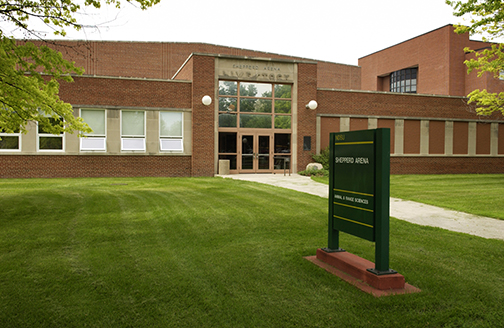
Equine Science
This is an archived copy of the 2018-19 catalog. To access the most recent version of the catalog, please visit https://catalog.ndsu.edu.
The equine science program includes course work in equestrian styles, nutrition and physiology, selection and management of the horse enterprise. The roles of the horse in society—recreational, therapeutic and performance—are discussed. The department offers programs of study and extra-curricular activities that facilitate the development of the student in the horse industry at many diverse entry points.
The equine science major is designed to provide a strong overall background with supporting course work in the sciences, humanities and general education. The student will be prepared in equine production and management. The choice of a minor in equine science offers the student diversity in his or her educational program while preparing the participant for recreational endeavors involving horsemanship. A minor in equine science can accompany essentially any major offered at North Dakota State University. A minor in equine assisted activities and therapies provides students with a background in therapeutic horsemanship. This minor can accompany essentially any major offered at NDSU.
Equine science students are qualified to become involved in many diverse occupations. These include such varied activities as training horses, managerial support, sales of pharmaceuticals and livestock products, and other agribusiness professions. Graduates are likely to obtain employment at academic institutions, government stations, foreign assignments and private industry. Specific areas of employment are 4-H Extension opportunities, university and community college teaching, horse exhibitions and horse breeding operations. Animal feed sales, equine magazine publications and public relations for breeding operations provide many different avenues of opportunity.
Plan of Study
Please note this is a sample plan of study and not an official curriculum. Actual student schedules for each semester will vary depending on start year, education goals, applicable transfer credit, and course availability. Students are encouraged to work with their academic advisor on a regular basis to review degree progress and customize an individual plan of study.
| First Year | |||
|---|---|---|---|
| Fall | Credits | Spring | Credits |
| ANSC 101 | 1 | ANSC 223 | 2 |
| ANSC 260 | 2 | BIOL 111 | 3 |
| MATH 103 | 3 | BIOL 111L | 1 |
| ENGL 110 | 4 | COMM 110 | 3 |
| VETS 135 | 3 | ENGL 120 | 3 |
| Social/Behavioral Science and Cultural Diversity | 3 | Humanities/Fine Arts | 3 |
| 16 | 15 | ||
| Second Year | |||
| Fall | Credits | Spring | Credits |
| AGEC 242 | 3 | AGEC 244 | 3 |
| ANSC 235 | 2 | MICR 202 | 2 |
| ANSC 261 | 1 | MICR 202L | 1 |
| CHEM 117 | 3 | STAT 330 | 3 |
| CHEM 117L | 1 | ECON 201 | 3 |
| ANSC 260L | 1 | Humanities/Fine Arts | 3 |
| Elective | 3 | ||
| 14 | 15 | ||
| Third Year | |||
| Fall | Credits | Spring | Credits |
| ANSC 360 | 3 | ANSC 364 | 3 |
| PLSC 315 | 3 | ANSC 358 | 2 |
| ENGL 32X Upper-level Writing | 3 | BIOC 260 | 4 |
| NRM/PLSC/RNG Any level course | 3 | ANSC 371 | 3 |
| ANSC Elective | 3 | Elective | 3 |
| 15 | 15 | ||
| Fourth Year | |||
| Fall | Credits | Spring | Credits |
| ANSC 393/396 Internship/Research | 2 | ANSC 480 | 3 |
| ANSC Elective | 6 | ANSC 478 | 3 |
| Elective | 5 | ANSC 463 | 3 |
| Wellness | 2 | ANSC 463L | 1 |
| Elective | 5 | ||
| 15 | 15 | ||
| Total Credits: 120 | |||
